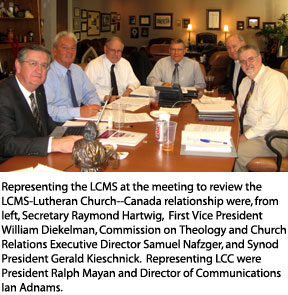Representatives of Lutheran Church–Canada (LCC) and The Lutheran Church–-Missouri Synod met at the LCMS International Center in St. Louis Nov.
At the conclusion of the daylong talks, all participants agreed with LCMS President Gerald Kieschnick that it had been “a very good day.”
Also representing the LCMS were First Vice President William Diekelman, Secretary Raymond Hartwig, and Commission on Theology and Church Relations (CTCR) Executive Director Samuel Nafzger. Representing LCC were President Ralph Mayan and Director of Communications Ian Adnams.
Discussions centered around the protocol document developed by the two church bodies almost 20 years ago when most Canadian LCMS congregations formed Lutheran Church–Canada with the blessing of the LCMS. The only proposed change is the deletion of a provision requiring the publication of each church body’s membership rosters in the Annual of the other, a requirement rendered non-essential with changes in communication technology.
The group also examined a number of operating agreements developed in the years following the protocol agreement. These assist the church bodies in working together in such areas as missions, higher education, parish services, and movement of graduates and church workers across church-body lines. Future meetings will work toward updating these agreements.
Additional topics discussed during the one-day meeting included cooperative efforts by LCC and LCMS districts in local and worldwide mission efforts, the translation of CTCR documents into Spanish, the ministries of auxiliary organizations, and relationships with other sister and partner churches.
“The representatives attending the meeting agreed that Lutheran Church–Canada and The Lutheran Church–Missouri Synod enjoy a unique and enduring relationship that warrants being highlighted and celebrated by the members of both church bodies,” Hartwig said.
He indicated that “to maintain ongoing communication,” the representatives agreed to “a formal annual meeting to discuss areas of mutual interest and concern.”
Posted Dec. 12, 2007
